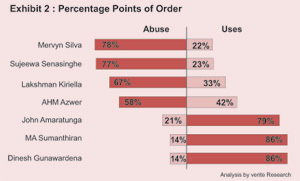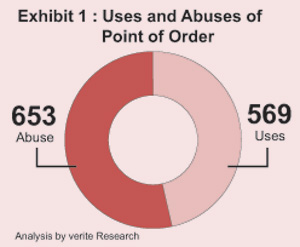News
Use and abuse of ‘Points-of-Order’ in Parliament
View(s): A‘point-of-order’is an important instrument of Parliament, which all members have a right to. The purpose is to bring to the attention of the House, that some aspects of accepted Parliamentary norms are being violated. That is its proper ‘use’. The right can also be ‘abused’. That happens when a member purports to have a point of order, but makes a flawed representation to interrupt proceedings or cause a disturbance.
A‘point-of-order’is an important instrument of Parliament, which all members have a right to. The purpose is to bring to the attention of the House, that some aspects of accepted Parliamentary norms are being violated. That is its proper ‘use’. The right can also be ‘abused’. That happens when a member purports to have a point of order, but makes a flawed representation to interrupt proceedings or cause a disturbance.
 Making a proper point-of-order requires active listening, and a good command of Parliamentary procedure. Therefore, tracking the use and abuse of points of order is important. It indicates the alertness of members and the integrity of their participation: Are they using or abusing this facility? Half the MPs were not awake to points of order
Making a proper point-of-order requires active listening, and a good command of Parliamentary procedure. Therefore, tracking the use and abuse of points of order is important. It indicates the alertness of members and the integrity of their participation: Are they using or abusing this facility? Half the MPs were not awake to points of order
Manthri.lk is a pioneering online platform that monitors and ranks all the proceedings and actors in Parliament. Its data for 28 months, from May 2012-August 2014, during which there were 206 sittings, show that, on average, six points-of-order are made per Parliamentary sitting (a total of 1,222). However, almost half the members of Parliament (49%) failed to raise even a single point-of-order during those 206 Parliamentary sittings.
Is it better to be asleep or awake and disruptive?The fact that half the MPs were not awake to points of order does not mean the conduct of the other half is creditable. It turns out that, the half that were making points-of-order were, overall, more prone to ABUSE points-of-order (invoke it improperly to disrupt) rather than to articulate a proper point-of-order.
Exhibit 1 shows that, of the total, only 47% of the points-of-order conformed to proper use, 53% were an abuse of the instrument. Perhaps then, there is some virtue to being in the more sleepy half of Parliament – at least they are not using points-of-order to disrupt proceedings.
 Halls of fame for using and abusing points-of-order
Halls of fame for using and abusing points-of-order
Proper users: Manthri.lk documents 20 MPs as having made at least 15 points-of-order during that period. Among these, in percentage terms, Dinesh Gunawardena (Chief Government Whip) has the highest rate – 86% – of using points of order properly (Exhibit 2). Next in line are M.A. Sumanthiran (86%) and John Amarathunga (79%).
Abusers: Of these 20 MPs, in percentage terms, Mervyn Silva was the greatest abuser (Exhibit 2), where more than three-fourths (78%) of his points-of-order are abuses of the procedure. Two other leading abusers are Sujeewa Senasinghe (77%) and Lakshman Kiriella (67%).
Guinness record for greatest user as well as abuser
One MP stands out for the sheer number of points-of-order made. A full 27% of all the points-of-order in Parliament were made by A.H.M. Azwer (a total of 326 of the 1,222). The next highest is Ravi Karunanayake with just 78 points-of-order. That means Mr. Azwer asked four times more than the second highest.
In absolute numbers, Mr. Azwer is both the highest user and the highest abuser of points-of-order: 188 (58%) were abuses and only 138 (42%) were proper uses. In total, Mr. Azwer is responsible for 24% of the total proper uses of points-of-order, and 29% of the total abuses of points-of-order.
The data from Manthri.lk suggests that some MPs are causing a great deal of disruption in Parliament by the improper use of points-of-order. How can Parliament be safeguarded from such disruptions? Who should be responsible for the solution?
Please write your thoughts to feedback@manthri.lk or by text to 0714 639 882.

